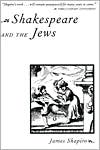

 |

|

The average rating for Shakespeare and the Jews based on 2 reviews is 4 stars.
Review # 1 was written on 2020-07-13 00:00:00 Brent Tripet Brent TripetI was prompted to read Shapiro's book because we recently watched the 2004 film of the Merchant of Venice, in which Al Pacino plays Shylock as simultaneously an object of loathing and a man to be pitied. A book with the title Shakespeare and the Jews seemed right on target for me to understand more of the world about which Shakespeare was writing. Where did The Jews fit? What were the circumstances that led Shakespeare to write this play which has often been seen as pitting virtuous Christians against a cruel and greedy Jew. Shapiro puts the pay into a wider context: In his preface to the 2016 edition, he emphasises an underlying argument of his book: 'The Merchant of Venice largely concern how individuals deal with those they perceive as different, and that hostility to difference - racial, national, sexual, religious - deforms those who are ignorant and coarsens any society that condones it'. This book is also much wider than an analysis of the play, it's a comprehensive and challenging portrayal of Jews in from the time of their first expulsion in 1290 up until the eighteenth century, with the focus on questions concerning Jews in Elizabethan times when Shakespeare was writing. In the first chapters, he sets out the history of Jews in England, using multiple archival sources to demonstrate their continuing presence despite expulsions (nearly 50% of the book is taken up with notes, bibliography and index). Its chapter headings give a fair indication of the territory Shapiro covers, but no real clue as to the horrors of the prejudices and beliefs held in England over centuries. 'First Jews and Counterfeit Christians'; 'Myths, Histories, Consequences' (horrific); The Jewish Crime'; "The Pound of Flesh"; 'The Hebrew Will Turn Christian'; 'Race, Nation or Alien?'; and 'Shakespeare and the Jew Bill of 1753'. He shows that, over centuries, Jews were believed to be utterly different from the English - in religion, race, nationality, sexual characteristics and behaviour. In the later chapters Shapiro explores the question of English cultural identity in late 16th and early 17th centuries at the time Shakespeare was writing. The great upheavals that followed Henry VIII's break from Rome meant that religious affiliation within the Christian church itself lead to discrimination and exclusion depending on the monarch of the time and could be a matter of life and death. If a Catholic or Lutheran Christian was excluded from positions in society, where did that leave the Jews? Could you be English if you were Jewish? Or did you have to be a member of the Church of England? Elizabethan views on Jews matter today, Shapiro argues, because Shakespeare is held to be at the heart of English identity, The Merchant of Venice is one of his most frequently performed plays, and new generations are confronted with the play's themes and attitudes. The last sentence of Shapiro's Preface reads: 'Sadly, twenty years on, Shakespeare's play and this book's subject - what ugly myths lead those with insecure identities to think and do when they feel threatened - remain as timely as ever'. Even more sadly, intolerance and hate seem to be spreading ever wider. It's not easy reading, but it's not an easy subject. I haven't watched this Youtube discussion between Howard Jacobson and James Shapiro, but I will. |
Review # 2 was written on 2011-09-13 00:00:00 Maciej Kucharski Maciej KucharskiA more accurate title would have been "Jews and Jewish Identity in England, 1290-1833," but that wouldn't have attracted as many readers (including me) as Shakespeare and the Jews, and we would have missed an interesting book. Quite a small proportion of the book is about Shakespeare's Merchant of Venice, even about its influence: I'm not entirely convinced about the connections between the play and the "Jew Bill" providing for naturalization of Jews in 1753, especially after reading quoted passages from many antisemitic polemics that make no reference to the play at all. In a section called "Shakespeare, Englishness, and the Jews," Shapiro does provide a fascinating look at various scholarly (and not so scholarly) attempts to absolve the quintessential English poet of either hatred of or sympathy for Jews. For him, controversies about the play bring out the prevalence of myth in conceptions of national identity, so that "censoring the play is always more dangerous than staging it." Productions would do well to consider this book. |
CAN'T FIND WHAT YOU'RE LOOKING FOR? CLICK HERE!!!